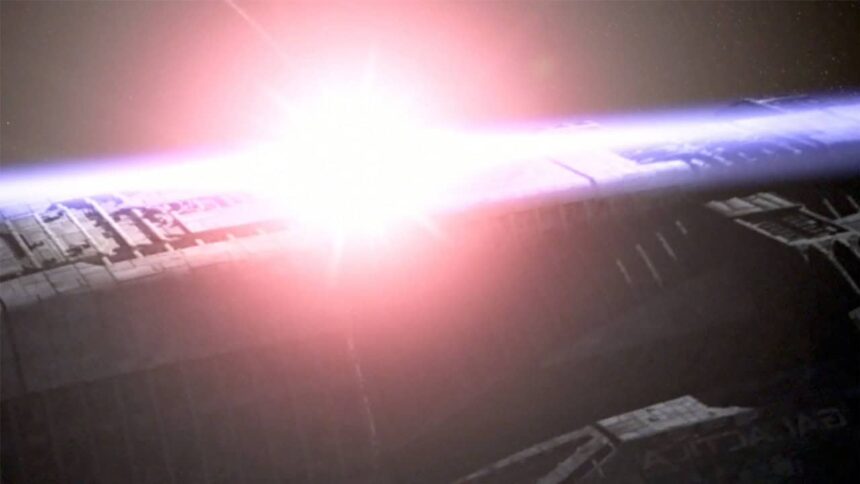By Joshua Tyler
| Published

When the reimagined Battlestar Galactica finished in March 2009, it had the two things a franchise needs: audience heat and critical credibility. During its run, episodes of the show aired in theaters to eager packed audiences. It was a water coolor topic of conversation and sucked in even people who weren’t into science fiction.
The final run averaged 2.2M viewers in the U.S., and the finale spiked to ~2.4M, the show’s best number in years. Those may not sound like big numbers, but they were huge for a show airing on SyFy, a basic cable channel people otherwise ignored.

When Battlestar Galactica arrived on DVD, it became an even bigger hit as people bought box sets and binged the show all at once in the pre-streaming era. Battlestar popularized the idea of binge-watching, setting the stage for the streaming future that was to come.
The BSG universe was perfectly poised to go bigger and become the kind of mega-media franchise that lasts for generations. Star Trek turned itself into a mega-franchise after being canceled three seasons in, and here was Battlestar Galactica riding a wave of success that should have made it much easier to propel to the next level.
Instead, the follow-through came in stuttered moves that dispersed attention and trained fans to stop checking in. Only a few short years after its success, Battlestar Galactica was a dead franchise, a once-in-a-generation missed opportunity by SyFy’s parent company, NBCUniversal.
How NBCUniversal Squandered Battlestar Galactica’s Potential With Its Next Show

NBCU/Syfy did produce companion pieces: Razor (2007) during the run and half-hearted DVD-only The Plan (2009) after, but the core “what’s next” arrived as Caprica in 2010.
Creatively ambitious and tonally different (corporate intrigue over space combat), Caprica gave fans something with the Battlestar Galactica name on it that bore no resemblance to the franchise they loved other than its name.

Imagine if, after Star Trek was cancelled in the 60s, CBS had decided to follow it up with a Star Trek police procedural set on Earth, and you’ll start to understand what a horrible mistake Caprica was.
Caprica needed patient scheduling and a clear runway to overcome the hurdle of its premise. It didn’t get either.
Ratings slid from a 1.6M mid-season high to <900k after a hiatus; Syfy then canceled the show and pulled the remaining episodes from its schedule, burning them off months later. Whatever audience was willing to follow learned the wrong lesson: don’t invest.
After Caprica, NBCUniversal Stopped Caring

After Caprica, the series Blood & Chrome was announced, and it sounded like the crowd-pleaser they should have made in the first place. It was to be about young Adama in a Cylon War setting.
Unfortunately, NBCUniversal had already quit on BSG. Rather than a fast series order and a serious investment, the project arrived as a 10-part web series on Machinima in late 2012 and only later as a TV movie in early 2013.
Battlestar Galactica needed a grand Star Trek: The Motion Picture-style blockbuster movie to push it to the next level. NBCUniversal gave it a low-budget web series.
Producer David Eick publicly positioned Blood & Chrome as “always meant” for online, but that didn’t make it better; it just made it more insulting.
SyFy Gets Turned Into A Wrestling Channel

While all this was unfolding, the channel that launched Battlestar Galactica was repositioning itself. Sci Fi Channel rebranded to Syfy in 2009 and leaned harder into broader-appeal reality/wrestling alongside genre.
Turning your science fiction channel into a wrestling channel was always a bizarre choice. It diluted the sense that “space opera lives here,” right when Galactica fans needed a dependable home for successors. Trade coverage and industry commentary at the time called out the shift and the cancellations clustered around quality scripted sci-fi.
NBCUniversal Throws Ron Moore’s Sci-Fi Universe Away

Universal eventually began announcing Battlestar Galactica feature films. Except they were all reboots, and not continuations of the show. There was one with Bryan Singer attached in 2011, later Francis Lawrence in 2016, then Simon Kinberg in 2020. None of them actually happened.
What had happened is NBCUniversal clearly signaling to fans that the once-in-a-generation sci-fi universe Ron Moore spent ten years building was being thrown in the garbage and that if BSG ever came back, they’d be starting all over from scratch. Universal produced a hit show and then decided to erase it and start over rather than continue to grow.

Imagine if, instead of giving William Shatner’s Captain Kirk a movie, they’d recast him and redid all the same episodes again. Or instead of introducing a new show set in the same universe, in the form of The Next Generation, Star Trek had wiped the slate clean, created a new sci-fi universe, and slapped the old name on it.
Unfortunately, that’s now standard practice in Hollywood.
That mentality is why there has never been another long-running sci-fi universe like Star Trek or Star Wars, and it’s why there will never be. Battlestar Galactica was perfectly poised to take that trip, but no one at Universal dared to make a real investment.



